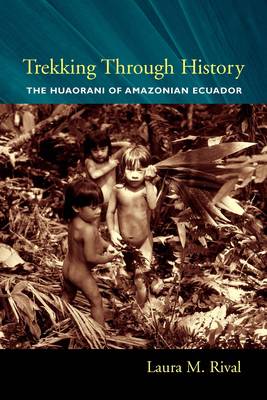
- Afhalen na 1 uur in een winkel met voorraad
- Gratis thuislevering in België vanaf € 30
- Ruim aanbod met 7 miljoen producten
- Afhalen na 1 uur in een winkel met voorraad
- Gratis thuislevering in België vanaf € 30
- Ruim aanbod met 7 miljoen producten
Zoeken
Omschrijving
The Huaorani of Ecuador lived as hunters and gatherers in the Amazonian rainforest for hundred of years, largely undisturbed by western civilization. Since their first encounter with North American missionaries in 1956, they have held a special place in journalistic and popular imagination as "Ecuador's last savages." Trekking Through History is the first description of Huaorani society and culture according to modern standards of ethnographic writing. Through her comprehensive study of their extraordinary tradition of trekking, Laura Rival shows that the Huaorani cannot be seen merely as anachronistic survivors of the Spanish Conquest. Her critical reappraisal of the notions of agricultural regression and cultural devolution challenges the universal application of the thesis that marginal tribes of the Amazon Basin represent devolved populations who have lost their knowledge of agriculture. Far from being an evolutionary event, trekking expresses cultural creativity and political agency. Through her detailed comparative discussion of native Amazonian representations of history and the environment, Rival illustrates the unique way the Huaorani have socialized nature by choosing to depend on resources created in the past--highlighting the unique contribution anthropology makes to the study of environmental history.
Specificaties
Betrokkenen
- Auteur(s):
- Uitgeverij:
Inhoud
- Aantal bladzijden:
- 256
- Taal:
- Engels
- Reeks:
Eigenschappen
- Productcode (EAN):
- 9780231118453
- Verschijningsdatum:
- 1/06/2002
- Uitvoering:
- Paperback
- Formaat:
- Trade paperback (VS)
- Afmetingen:
- 146 mm x 241 mm
- Gewicht:
- 394 g

Alleen bij Standaard Boekhandel
+ 169 punten op je klantenkaart van Standaard Boekhandel
Beoordelingen
We publiceren alleen reviews die voldoen aan de voorwaarden voor reviews. Bekijk onze voorwaarden voor reviews.











